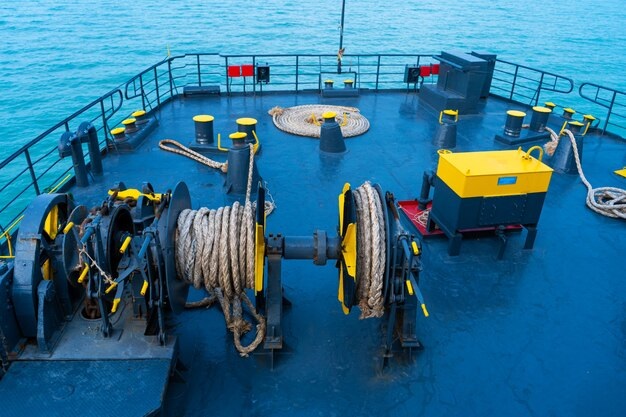Marine equipment stands as a crucial element in the realm of oceanic operations, encompassing endeavours such as commercial and recreational fishing, as well as offshore oil and gas exploration. Ranging from fundamental components like anchors, winches, and buoys to intricate systems including navigation and propulsion systems, communications devices, and underwater sensors, these tools are crafted to endure the unforgiving expanse of the open seas while prioritizing the safety of those who rely on them. In this exploration, we delve into the diverse types of marine equipment utilized today, shedding light on their advantages and disadvantages.
Types of Marine Equipment
Marine equipment plays a pivotal role in ensuring the seaworthiness and operational efficiency of boats and vessels, whether for leisurely sailing or industrial purposes. Anchors, mooring lines, pumps, and navigation instruments are among the varied equipment required for successful marine operations. Understanding the array of affordable marine equipment available is vital for selecting the appropriate gear to suit specific needs.
Anchors, fundamental to maritime stability, come in diverse types such as mushroom anchors, grapnel anchors with multiple flukes, plough anchors with two wings for effective penetration into the seabed, and Danforth-style fluke anchors designed for softer bottoms like mud or sand. Anchor systems include not only chains for weight distribution but also shackles and swivels for connecting chain links. Mooring lines, another critical aspect of maritime security, are crafted to withstand strong winds and ocean currents, ensuring stability without compromising under pressure.
Safety Considerations for Marine Equipment
Safety emerges as a paramount concern in the use of marine equipment, regardless of its application—be it recreational or industrial. Ensuring proper maintenance, secure storage, and adherence to safety protocols are imperative.
Routine inspections and servicing, conducted by experienced technicians, form the foundation of proper maintenance to identify potential issues before they escalate into accidents. Secure storage and handling procedures, implemented during periods of non-use, mitigate the risk of accidents caused by mishandling or negligence. Equipping personnel with appropriate safety gear, including life jackets, helmets, gloves, and goggles, is non-negotiable. Thorough familiarity with operating instructions is equally crucial to prevent mishaps during machinery operations offshore or on boat decks.
Maintenance and Upkeep of Marine Equipment
For boat operators, the onus is on maintaining and upkeeping marine equipment to ensure safe and efficient operations, avoiding costly repairs and downtime. Regular cleaning, encompassing the boat’s hull, exposed metals, and surfaces prone to saltwater buildup, safeguards against rust and corrosion.
Systematic checks of electrical components, hoses, and fuel filters are essential, with immediate replacement of faulty parts to avert safety hazards and engine failure. Adhering to manufacturer-recommended schedules for filter replacements prevents issues such as overheating due to fluid loss.
Benefits of Using the Right Marine Equipment
The advantages of employing suitable marine equipment extend across safety, performance, fuel efficiency, and overall comfort. Investing in up-to-date navigation systems and safety devices enhances safety during boating, mitigating risks posed by adverse weather conditions or other vessels. Quality marine components, such as engines and propellers, improve overall performance and fuel efficiency, ensuring a smoother ride and reducing concerns about running out of fuel. Enhanced comfort during boating adventures is another dividend of investing in high-quality seats or cushions.
Conclusion
In conclusion, marine equipment is indispensable for individuals engaged in a spectrum of activities at sea. Beyond providing safety and protection in hazardous conditions, it furnishes the tools necessary for effective task completion. Recognizing marine equipment as a vital investment underscores the need for diligent care and proper maintenance, ensuring a secure and successful maritime journey.
